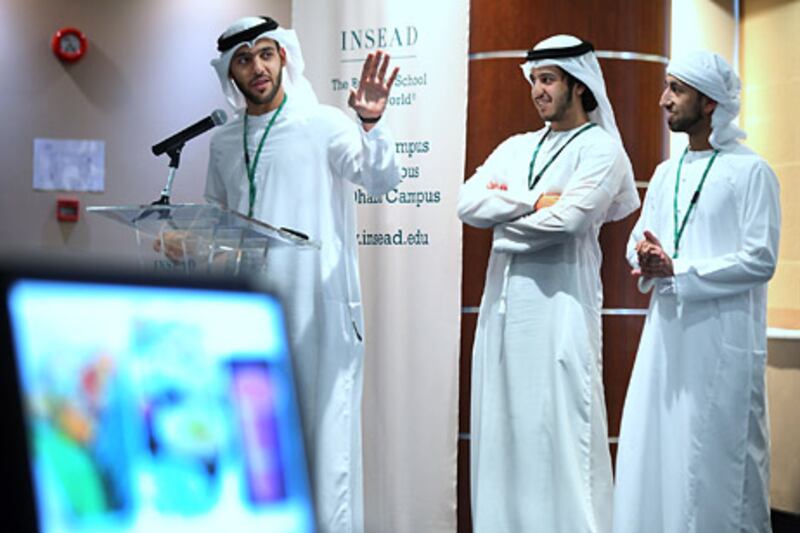Studying entrepreneurship in the Emirates has often meant reading through case studies sprinkled with well-known names such as Steve Jobs, Bill Gates, Mark Zuckerberg and others from the West.
But a group of students from Zayed University, through guidance from their professors and entrepreneurship experts from Insead business school in Abu Dhabi, are adding new names to that list: Amina Taher of Slices restaurant, Azza Al Qubaisi of the Arjmst art and jewellery company, and Qais Sedki of Pageflip Publishing, as well as others who have started ventures in the UAE.
As Ahmed Salah Al Marzouqia Zayed University student put it, Ms Taher and her colleagues who founded Slices in Abu Dhabi have created a healthy growth strategy for their restaurant. It is one from which budding entrepreneurs can learn. They targeted health-conscious customers and found out where they worked and lived.
"For example, the business community, the educational community and hospitals - this is part of their long-term expansion plan," Mr Al Marzouqi said at Insead this week, when he presented a case study about Ms Taher and Slices alongside his classmates.
Case studies, stories that emphasise the challenges and strategies of entrepreneurship, are increasingly being localised to help improve the overall quality of business education here.
In January, the Academy of International Business's Middle East and North Africa chapter as well as the University of Wollongong in Dubai released the second volume of their book Actions and Insights, which includes another round of case studies spotlighting companies in the UAE.
"Our idea is really trying to address the shortcoming of lack of teaching materials with local, cultural context to facilitate the learning of entrepreneurship," said Victor Huang, an assistant professor who teaches small business management at Zayed University's College of Business Sciences.
At the same time, these academic tales are being publicised to inspire more UAE nationals to turn ideas into successful ventures and to create a culture of entrepreneurship.
"Stories change culture," said Stephen Mezias, a professor of entrepreneurship and family enterprise from Insead who spoke at an event. "I think a great way to change culture is introduce new stories."
Instead of writing case studies themselves, professors at Zayed University asked students to get involved in the process by having them work with five entrepreneurs, while highlighting different elements of creating a business.
Ms Al Qubaisi was cited as an example of someone who used her passion for art to create a business that now also caters to companies that want larger orders of corporate gifts.
"She used word-of-mouth [marketing] and would secure her place in exhibitions [such as the] Al Ain Airshow," said Zayed University student Meera Abdulla Seddiq Mohd Samea Al Mutawa.
"Who would think of putting [a jewellery stand] in the Al Ain Airshow?"
Entrepreneurship experts say it will take time to develop a robust collection of local case studies, and they are trying to get more students interested in the development process. The case study of Ms Al Qubaisi includes snippets of question-and-answer sessions via video that students helped to record. Classmates were also encouraged to collaborate on the project using the microblogging site Twitter.
"These cases [are about] learning from role model entrepreneurs here in the UAE - not somewhere else in the world," said Florian Schloderer, a postdoctoral fellow at Insead.





